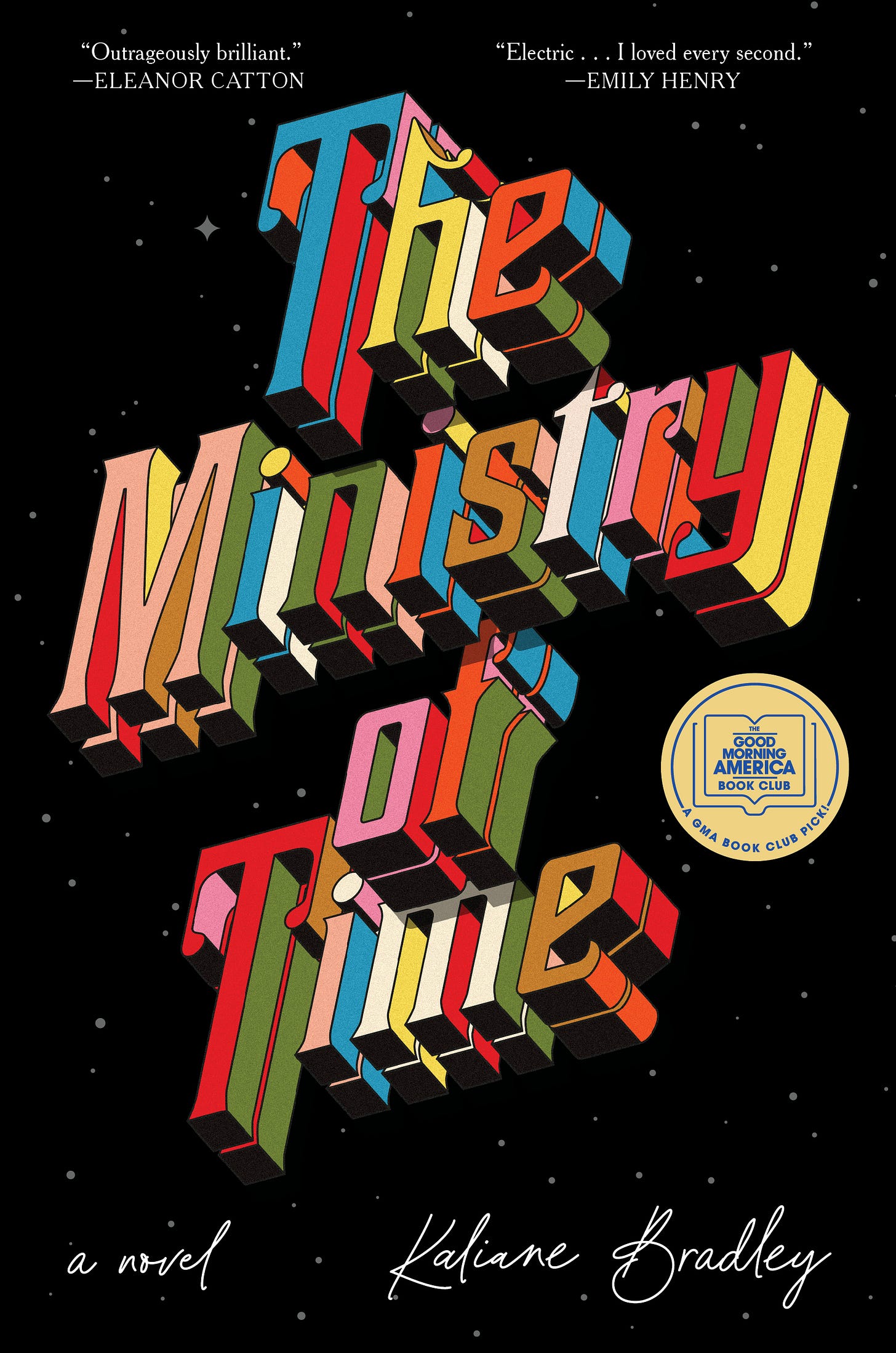Why demand a map for uncharted territory?
Lit Chat Vol. 26 — April in Review
Hi friends,
While I certainly sympathize with those who feel maligned by April’s traditional cruelty, I had kind of a great month?
We started strong with a double-whammy afternoon of Reading Club at my place followed by the second Heat Lightning poetry series reading at Anaïs, which left me positively glowing with appreciation for such a warm and talented community.
This feeling was sustained by a return to an in-person writing workshop group later in the month, a fabulous first-time visit to the Ripped Bodice in Park Slope for a book event, and the launch party for my dear friend Zoë’s truly incandescent chapbook with No, Dear, which you’ll hear me chat (rave) about more in a future letter.
Oh, and we adopted another cat! His name is Ollie (Oliver) and we love him a whole lot. He likes to climb my bookshelves and take all my knick-knacks with him on the way down.
I also didn’t have to travel anywhere in April, which rocked because a travel-free month is rare for me and because this meant plenty of time for slow mornings on the couch with a book, which is my preferred habitat.
I’ll stop gloating now and get to those books, but in the meantime, if you want to see the full book cover pyramid, click below to read this on the blog (it’s very black and red-forward this month):
THE FOUNDATION:
Mornings Without Mii — Mayumi Inaba, tr. Ginny Tapley Takemori
This book was a birthday gift from my sweet pal Michy, which I fittingly decided to read the week we applied to adopt Ollie. A classic in Japan since it was first published in 1999, Mornings Without Mii is a memoir of a writer’s life through the lens of her relationship with her cat, Mii. Though a devoted pet parent for nearly twenty years, I did find some of Inaba’s care choices difficult to read, especially towards the end of Mii’s life—I’d be remiss not to caution any sensitive pet lovers to be prepared for end-of-life suffering and death. That aside, this is a moving portrait of a very special, life-defining bond, and will make you want to give all the animals in your life a big smooch.
Lunch Poems — Frank O’Hara
April was National Poetry Month, and coming off the heels of a San Francisco trip in March, I was inspired to revisit the City Lights edition of Lunch Poems that I bought there last year and spend a slow morning with Frank’s poems. I love how they evoke a nostalgia for a New York I never knew, but which feels simple and familiar and right. Often written during his lunch breaks from working at the MoMA, the poems serve as an emotional time capsule of both daily minutia and breaking news (see: “The Day Lady Died” and “Poem [Lana Turner has collapsed!]”). I was especially charmed by the copies of O’Hara’s and Lawrence Ferlinghetti’s correspondence about the book, which is collected at the end of the volume.
A Tale of Two Cities — Charles Dickens
I was still riding my long audiobook kick well into April and was once again delighted to find that a new-to-me classic held up as a timeless story of intrigue, romance, and tragedy. A poorly-timed Jeopardy question did spoil the ending for me, but even with a premonition of the protagonists’ fate, I was still kept in rapt suspense the whole 18+ hours (despite the narrator’s slightly irritating pronunciation of “revolutionary,” which says a lot considering the book takes place during the French Revolution). Having listened to a few Dickens novels on audio now, it’s interesting to me how many of them revisit similar themes of loyalty and justice, madness and imprisonment, and of course, love that defies the odds. Say it with me: classics are classics for a reason! Dickens has yet to let me down.
SOLID SUPPORTS:
Blackouts — Justin Torres
I have such a fascination with the emerging trend of incorporating mixed media into novels (see: my well-documented admiration for Catherine Lacey’s Biography of X). This time, Blackouts takes its name from a volume of blackout poetry made from an academic study of sex variants, which features prominently in the novel. The volume in question is the project of a dying man named Juan Gay, and is about to be bequeathed to our narrator, his ad hoc caretaker.
The narrative of the present day is visually broken up by pages from the book and photographs of its subjects and other artifacts from Juan’s life, bleeding into the stories that he and the narrator tell each other through the long nights of Juan’s final days. The bond between them is what captivated me the most; though both men are queer and spend most of the book in bed, theirs is primarily an intellectual companionship built on a foundation of mutual care, trust, and deep love. This was a quick read that now has me remembering it like a fever dream and already inclined to revisit.
Madonna in a Fur Coat — Sabahattin Ali, tr. Maureen Freely and Alexander Dawe
Keeping up with my goal to read more in translation, I joined a book club at my office that’s doing exactly that! Their pick this month was this 1946 Turkish novel about the intense friendship between two outsiders in 1920s Berlin, which prompted a really thoughtful debate on the definition of romance and platonic vs. romantic love. I’m gonna do something a little different with this one and send you over to the most recent Pages+Pours newsletter for my full review!
I was fortunate to be a featured reader at last week’s book swap, where I shared my review of the novel with a recommended drink pairing. Kelly has cultivated such a smart, engaging, and welcoming community there, and I felt so safe testing out my wobbly public speaking chops! I highly recommend all my fellow bookish NYC gals come join me at the next one.
THE TIPPY TOP:
The Ministry of Time — Kaliane Bradley
This was one of those books that ticks so many of my boxes, I knew I’d be obsessed even before I started reading. Our unnamed narrator, a British civil servant, has been selected to become a “bridge” for a top-secret government program formed to extract people from the past and attempt to repatriate them into the present. (Time travel: check!) Our narrator’s assigned expat is Commander Graham Gore, a dashingly sincere naval officer plucked from a doomed Arctic expedition in 1847.
We often see characters travel back and forth in time in fiction, but I think it’s rarer for characters from other times to travel to ours like this. I found it a fascinating thought experiment, to see Gore and his cohort attempt to adjust to their new surroundings while also being watched over, reported on, and subtly shaped by their bridges, who live with them and are their only link to the outside world.
Just as it seems that the chemistry building between Gore and the narrator is finally coming to a head (Victorian love interest: check!), so too, we learn, is a sinister plot that has been working its way through the highest levels of government to target bridges and their expats. (Government conspiracy: check!) Add to the mix a final twist I did not see coming, and you have a book that sent me into a deep spiral over how the choices one makes on a daily basis have the unwitting potential to shape history, the present, and the future—all in a single moment.
Thanks for reading! I will do my very best to get my May recap out in a timelier fashion, especially because I’ll have news to share soon on the next Reading Club and/or the summer Proust read-along I’ve been teasing for a while. (This is my way of holding myself accountable to actually hammering out all the details—I think I’m close!)
In the meantime, feel free to drop a comment or send me a note if any of these books are speaking to you! Always down to chat in all the usual places.
Until next time, happy reading!
<3 Catherine
Housekeeping note: all book links go to my Bookshop storefront, where each purchase supports independent bookstores (and this newsletter, because I get a small percentage of each sale).





